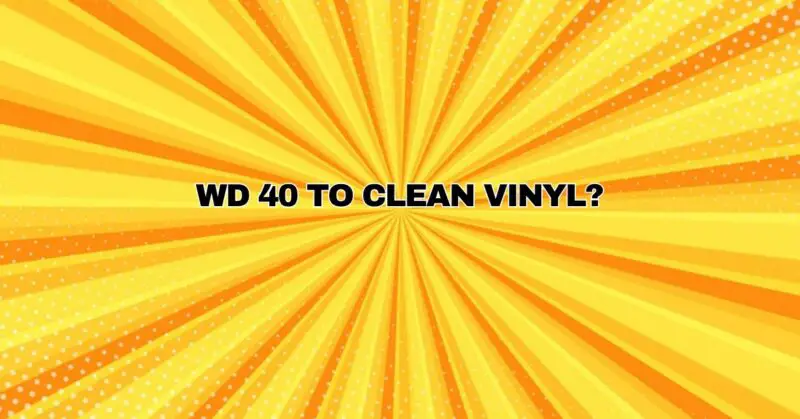Vinyl records are cherished for their warm, analog sound and the tactile experience they offer to music enthusiasts. Maintaining the quality of vinyl records is paramount for preserving their sound and ensuring they stand the test of time. However, there are persistent myths in the vinyl community, one of which involves using WD-40 as a cleaning solution. In this comprehensive article, we’ll explore the myth of using WD-40 to clean vinyl records, uncover the potential risks, and provide recommended methods for proper record cleaning.
The Myth: WD-40 as a Vinyl Record Cleaner
The idea of using WD-40 as a vinyl record cleaner has circulated among vinyl collectors and enthusiasts for years. Proponents of this approach claim that WD-40 can effectively remove dirt, dust, and even light scratches from records. The rationale behind this belief is that WD-40 is a versatile product known for its ability to penetrate and loosen substances, making it seem suitable for cleaning vinyl.
The Reality: The Dangers of Using WD-40 on Vinyl Records
While it’s true that WD-40 can be effective for various household and automotive purposes, using it on vinyl records is highly discouraged for several reasons:
- Chemical Residue: WD-40 is not designed for use on vinyl, and it leaves a chemical residue when applied to records. This residue can be challenging to remove entirely and may affect the playback quality of the record.
- Potential Damage: Vinyl records are delicate, and their grooves contain the audio information. WD-40’s chemical composition may interact with the vinyl material, potentially causing damage, warping, or even rendering the record unplayable.
- Noise and Static: WD-40 residue can attract dust and debris, leading to increased surface noise and static during playback. This can significantly degrade the listening experience.
- Record Label Damage: WD-40 can harm the paper labels on vinyl records, leading to discoloration, fading, or even label peeling.
- Lack of Effective Cleaning: While WD-40 may temporarily remove surface dirt, it doesn’t address deeper cleaning needs, such as removing mold, mildew, or embedded contaminants.
Recommended Methods for Proper Vinyl Record Cleaning
To care for your vinyl records and maintain their sound quality, it’s essential to follow proper cleaning methods:
- Carbon Fiber Brush: Invest in a high-quality carbon fiber brush designed for cleaning vinyl records. Gently brush the record’s surface in a circular motion before and after each play to remove loose dust and debris.
- Record Cleaning Solution: Use a dedicated record cleaning solution and a microfiber cloth or record cleaning brush. Apply the solution as instructed, and gently clean the record’s surface using a circular motion. Wipe off any excess solution with a clean cloth.
- Record Cleaning Machines: For serious vinyl enthusiasts, record cleaning machines provide a thorough and effective cleaning process. These machines use vacuum suction to remove dirt and cleaning solution from the record’s grooves.
- Storing Properly: Store your vinyl records in anti-static inner sleeves and protective outer sleeves to prevent dust and damage. Keep them upright in a cool, dry environment, away from direct sunlight and extreme temperature fluctuations.
- Handling with Care: Always handle vinyl records by their edges to avoid touching the playing surface, which can transfer oils and dirt to the grooves.
Conclusion: Preserve Your Vinyl Records with Proper Care
While the allure of a quick fix for cleaning vinyl records may be tempting, the risks and potential damage associated with using WD-40 far outweigh any perceived benefits. To preserve the sound quality and longevity of your vinyl collection, it’s essential to follow proper cleaning and maintenance procedures using dedicated vinyl record cleaning products. With the right care, your vinyl records will continue to provide you with countless hours of enjoyable, high-fidelity listening experiences.


